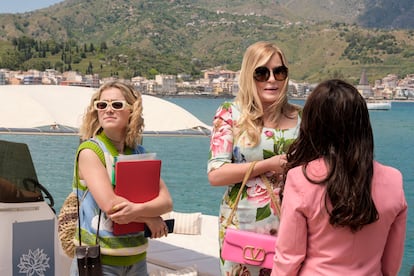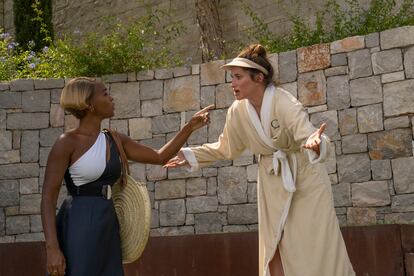Down with the rich: How the suffering of the upper classes has become a major on-screen theme
Recently, a handful of satires about the super-wealthy, their problems and the impact they have on the underprivileged have been released. But do these works really criticize them?

A raucous group of millionaires, each one of whom received their wealth from their parents, gather on a ship bound for an exclusive experience that promises to change their lives. That it does, but not in the way they expected. The ship arrives on a private island where the travelers are confronted, increasingly violently, with the consequences of the indecent accumulation of fortunes like theirs. They won’t all make it home alive.
This is the plot of not one, not two, but three films that have come out recently and satirize the wealthy: The Menu (2022), Glass Onion: A Knives Out Mystery (2022) and The Triangle of Sadness (2022; the film won a Palme d’Or at Cannes and has been nominated for three Oscars). It is also the plot of the first season of The White Lotus, the 2021 breakout hit (as well as that of the show’s second season, which, if anything, has been sounder than the first). When a topic is repeated three times, it’s no longer a fluke but a trend. When it happens on five occasions, it’s a sign of the times. The suffering of the rich has become a matter of global concern.

The boom has clear audiovisual roots in the HBO show Succession, which relates the viciousness of a comically ambitious and treacherous family of billionaires. The series has been a model for this genre practically since it premiered in 2018. For its part, Bon Joon-ho’s Parasite (2019) wasn’t the first film in which the South Korean director addressed the ravages of social inequality, but this one won him the Palme d’Or and the Oscar for Best Picture.
Beyond fictional representations, there is little mystery about the current origins of the theme. In two decades, the richest 1% in the US has gone from hoarding 8% of the nation’s wealth to 20%, and the same has occurred in Britain, Australia, Canada, parts of Europe and Japan. The coronavirus pandemic, which separates Succession from The Triangle of Sadness, has only exacerbated the problem: between the end of 2019 and 2021, the 1% in the US has increased its wealth dominance by 1.3%, while the rest of the population has grown poorer. According to Bloomberg, 131 billionaires doubled their wealth during that period. The world’s richest man, Bernard Arnault, was estimated to be worth $60 billion in 2020 and $159 billion by December 2022. The 2008 financial crisis, which the less well-off classes paid for with their homes and savings, started a boom in zombie stories (The Walking Dead, REC), which reflected a society surrounded by its dispossessed all at once. The era of inequality has given us the pain of the billionaires.

“We all love to see the rich suffer. It’s a question of proletarian resentment,” says Cristóbal Garrido, a screenwriter (Ghost Graduation, Reyes de la noche (Kings of the Night), who is currently working on director Juana Macías’ film El favor (The favor), which will depict the Spanish iteration of this theme (in Spain, the income of the wealthiest 10% of the population is now 11.8 times that of the poorest 10%: before the pandemic, it was five times the wealth of the poorest 10%). Garrido notes the sentiment has a universal component and, therefore, has become a goldmine: “In addition, reality shows that feature suffering celebrities draw more viewers and promote more discussion.” For his part, Mike White, the creator of The White Lotus, is such a fan of Survivor that he has participated in it several times.
But while all these projects share a common theme, they can also be (and have been) criticized for having the same flaws. One such critique is that they offer a broad-brush depiction of the upper classes, which is as realistic a portrayal as a zombie is of a person who has lost their home. That is, the characters are comically disconnected from the real world; they are foolish, naïve or simply tacky, and terminally selfish because of their circumstances. To a large extent, the characters’ wealth may be the defining trait of their personalities to a greater degree than satire requires.
Garrido admits that this lack of realism and complexity in the characters is partly because of how difficult it would be for a screenwriter to meet such vastly wealthy people in real life. “The affluent people we have access to are the ones on display, [such as] in Georgina or First Class [both Netflix]. Filthy rich people live in another world,” he explains. They are “so closed off that no matter how much you go out and document, you’re going to have to supplement what you see with what you intuit and what you need for the story. And you’re going to [stick with] what you know.”

Another slightly more perverse issue with these satires is the audience’s feelings about the ultra-wealthy: “As a viewer, you want to laugh at the rich. But you also want to belong to that class. The challenge is that you can identify with them and you can criticize them,” says Carlos Montero, the co-creator of the Spanish Netflix series about privilege, Elite. Christopher Bollen, the author of A Beautiful Crime (2020) and other crime novels that address the upper classes, agrees: “When watching these films, it’s inevitable to gawk at the designer clothes, the contemporary art, the mega-yachts and the cliff-top mansions... You see everything before they bring out the guillotine. These titles increase our cultural yearning for money and privilege, even as they claim to be against it,” he observes. “It’s the catch-22 of Gatsby. We fall in love with this inaccessible world while being told how pernicious and selfish it is.”
These new works deploy an old narrative loophole to both criticize the rich and extol them at the same time: death, which is as essential to Elite and Bollen’s novels as it has been throughout the genre’s history (for instance, we’ve always had Colombo or Agatha Christie’s Poirot). Killing someone who flaunts their privilege too much has always served as a pretext for entering their world. “There is a moral component of punishing those who are doing well,” says Montero. “It’s pure revenge. The rich get away with so much in this life that this new batch of movies, novels and series bring together murder and vast wealth, [which] satisfies a very basic desire,” adds Bollen.
But in recent satires of the ultra-privileged – especially in The White Lotus – murder is an essential part of the plot. Killing off rich characters is the quickest way to resolve the moral ambiguity of satirizing the wealthy while also expressing admiration for them. Death and money appear thematically linked: “We always take it for granted that all wealth stems from a crime, hence the link of these milieus in the mystery genre,” Bollen reasons. But more importantly, while some millionaires pay for the excesses of the system, others can learn the lesson without falling into the role of villains. Yes, they are responsible for the world’s ills but only incidentally. They have simply been favored by an archaic and perfidious system of which they are only passive accomplices.
Thus, these tales of wealth are framed in a curious manner. As portraits of the class that siphons off the world’s wealth, they do not offer the same detail as works by authors who were themselves raised among the super-rich. For example, Edith Wharton – the three-time Nobel prize nominee and the first woman to win the Pulitzer prize – was a member of the New York elite, which she later depicted vividly in classic works like The Custom of the Country (1913) and The Age of Innocence (1920).
As satires of wealth, neither has the same bite as, say, Mr. Burns from The Simpsons, one of the most well-known parodies of the 1%. The Burns character is based on John D. Rockefeller and other 19th century robber-barons, a term that has fallen into disuse but at the time had the connotation of a certain fearful inhumanity. But the rich are richer now, and we talk about them constantly and don’t demonize them as much as we once did.
Sign up for our weekly newsletter to get more English-language news coverage from EL PAÍS USA Edition
Tu suscripción se está usando en otro dispositivo
¿Quieres añadir otro usuario a tu suscripción?
Si continúas leyendo en este dispositivo, no se podrá leer en el otro.
FlechaTu suscripción se está usando en otro dispositivo y solo puedes acceder a EL PAÍS desde un dispositivo a la vez.
Si quieres compartir tu cuenta, cambia tu suscripción a la modalidad Premium, así podrás añadir otro usuario. Cada uno accederá con su propia cuenta de email, lo que os permitirá personalizar vuestra experiencia en EL PAÍS.
¿Tienes una suscripción de empresa? Accede aquí para contratar más cuentas.
En el caso de no saber quién está usando tu cuenta, te recomendamos cambiar tu contraseña aquí.
Si decides continuar compartiendo tu cuenta, este mensaje se mostrará en tu dispositivo y en el de la otra persona que está usando tu cuenta de forma indefinida, afectando a tu experiencia de lectura. Puedes consultar aquí los términos y condiciones de la suscripción digital.









































